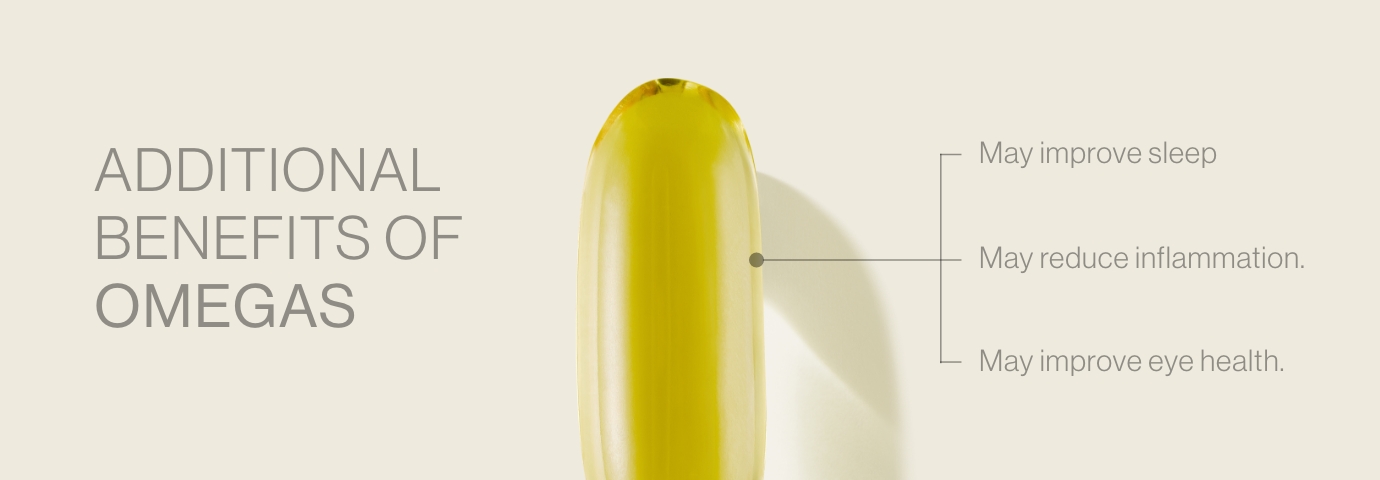Additional benefits from taking an omega supplement

Among the long line-up of benefits synonymous with taking omega supplements, those associated with skin health* rank high on the list. As the building blocks of your skin's surface layers, omega 3's and omega 6 fatty acids play a fundamental role for your skin, helping retain moisture and hydration levels. But did you know that upping your omega intake has a whole host of other health benefits too? From supporting bone and joint mobility to helping induce better sleep, below our skin experts reveal the lesser-known talents of omegas you should know about, but perhaps don’t.
May help with redness/inflammation
Inflammation is redness that contributes to skin accelerated ageing and poor skin barrier function. Studies have shown a connection between omega-3 supplements and reduced redness [1].

May help joint mobility, flexibility and range of motion
‘Research shows that omegas may help lay down calcium in the bones’. The foods you eat, including vegetables and protein, and your activity and movement are also key for bone health [2]. Healthy bones are fundamental to overall health and help support your brain, heart, and other organs from injury.
May help with sleep
As you know, good sleep is essential for your overall wellbeing and day-to-day life. Lack of sleep has been linked to a number of health issues, including high blood pressure and even depression.
Studies have suggested that omega fatty acids may improve the length and quality of your sleep. One found that higher blood levels of the long-chain omega-3 DHA (the main omega-3 fatty acid found in the brain) are significantly associated with better sleep [3].
May help support your mood
Depression is, unfortunately, extremely common. The mental health disorder is often characterised by symptoms of sadness, anxiety and lethargy, and it’s estimated to affect 1 in 6 people in the UK.
Though never a catch-all cure, studies now show that individuals who take omegas as a supplement are less likely to suffer from symptoms of depression [4].
Important for the eyes
'Research shows that when you don’t get enough DHA, it can cause vision impairment. DHA deficiency in the retina or eyes is associated with vision loss [5], DHA from omega-3 is a component of the retina of your eye,’ shares Dr Gaby Prinsloo.
Essential for the heart
Research has shown omega 3's have many benefits when it comes to heart health. One of them being it can help support your heart [6]. As your body doesn’t make enough omega-3 fatty acids on its own, it’s a good idea to consume them from your diet or via supplementation. High sources of omega 3s include salmon, mackerel, anchovies, sardines, and herring.
Whether you choose to try and increase your omega levels through your diet or you’re considering a supplement, omegas play a vital role for every function in your body. While they can help your skin look luminous on the outside, they are also key for what’s going on in the inside too.
*Vitamin A contributes to the normal maintenance of skin
Sources:
- Chronic Inflammation. National Library of Medicine. August 2022.
- Omega-3 fatty acids in pathological calcification and bone health. National Library of Medicine. June 2020.
- Higher levels of omega-3 in diet associated with better sleep. University Of Oxford. March 2014.
- Efficacy of omega-3 PUFAs in depression: A meta-analysis. National Library of Medicine. August 2019.
- Antioxidant Activity and Neuroprotective Role of Docosahexaenoic Acid (DHA) Supplementation in Eye Diseases That Can Lead to Blindness: A Narrative Review. National Library of Medicine. March 2021.
- An Update on Omega-3 Polyunsaturated Fatty Acids and Cardiovascular Health. National Library of Medicine. January 2021.
